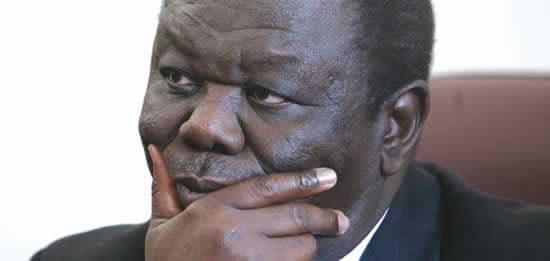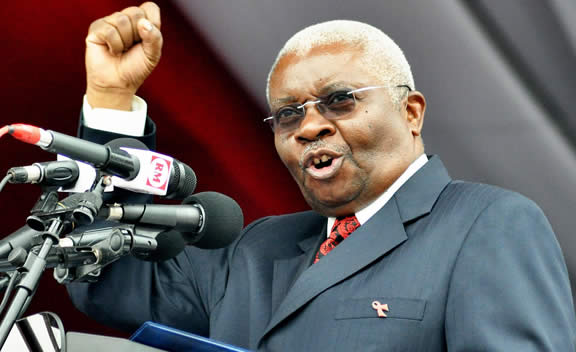Tsvangirai, MDC-T winning candidates cross swords

Herald Reporters
MDC-T leader Mr Morgan Tsvangirai is facing internal resistance over his plans to stop MDC-T members who made it in the harmonised elections from taking their seats in Parliament and local authorities. This, analysts said, had nothing to do with MDC-T’s purported protest over alleged rigging, but was a manifestation of Mr Tsvangirai’s fear of the power his secretary-general Mr Tendai Biti would wield as leader of MDC-T business in Parliament where Mr Tsvangirai cannot be in the wake of his dismal loss.
Mr Tsvangirai has since embarked on a whirlwind tour of his party’s 12 administrative provinces to sell his boycott agenda.
Fissures over the decision are already noticeable within the party, with elected legislators and councillors making clear their intention to defy the directive.
Observers say the MDC-T was now set for a second split pitting 2013 election winners against the losers, raising the spectre of the October 12, 2005 split spawned by differences over participation in Senate elections that year.
Some senior MDC-T officials have been attending parliamentary functions after Mr Tsvangirai issued his directive, while provincial leaders in Chitungwiza were already preparing to steer business in the new council that is set to be inaugurated soon.
MDC-T chief whip and incoming Mutare Central legislator Mr Innocent Gonese yesterday attended a parliamentary function despite his boss’ directive.
He pitched up at Parliament to attend the launch of a book titled: “A Guide to the Parliament of Zimbabwe,” which was attended by Vice-Chancellors from various universities, Judicial Service Commission members, United Nations Development Programme officials and Parliament’s development partners.
Mr Gonese was invited alongside outgoing Zanu-PF chief whip Cde Joram Gumbo and they were both officially recognised during the function.
Although Mr Gonese said he was not defying Mr Tsvangirai, it was clear that his actions were out of line with his leader’s intentions.
“I am here as former chief whip,” said Mr Gonese in an interview. “I am not here as incoming Member of the National Assembly. The new Parliament would come into effect after swearing in of the new President which has not yet taken place.”
Sources said the provincial committee for Chitungwiza province met late yesterday to deliberate on criteria to nominate councillors into positions in council.
The committee was discussing possible nominations for the mayor, the deputy and committee chairpersons.
“They have expressed interest in different positions in council,” a source in the party said. “Some are eyeing positions in council committees, while a few want to be either the mayor or deputy mayor.”
This is happening as it emerged yesterday that the party’s national council did not endorse the decision to boycott institutions at its recent meeting, contrary to claims by Mr Tsvangirai that he had its full backing.
Mr Tsvangirai met the Harare provincial committee yesterday and was expected to meet Chitungwiza province today to try and enforce the boycott.
“He is going to meet all the other provinces as a matter of urgency to explain to them the shortfalls of the just ended elections and for them to endorse his decisions to pull out of all levels of Government,” a source said.
The source added: “We met as the national council on Sunday and the issue of pulling out of all tiers of Government was never discussed. It was not even on the agenda. It was the national executive which met in the morning of the same day and resolved that we pull out.”
The source said no one from local authority to the national council level wanted a pull out, saying some individuals in the national executive were against the idea.
The source said there was infighting and finger pointing during the national council meeting.
“There was friction during the national council meeting as some members, among them Manicaland provincial chairperson Julius Magarangoma and Tongai Matutu blamed national organising secretary Nelson Chamisa for the defeat,” said the source.
“They accused him of manipulating party structures and surrounding himself with cronies instead of embarking on mass mobilisation like what Webster Shamu of Zanu-PF did. The accusations only ended after Tsvangirai intervened saying the party must look at the poll result wholesomely instead of blaming one individual.”
Zanu-PF has 197 seats after winning 160 inelective constituencies and gaining others following the division of the 60 seats reserved for women and those elected by proportional representation in each province.
Mr Tsvangirai’s MDC-T has only 70 seats and there are two for the MDC faction led by Professor Welshman Ncube.
This gives Zanu-PF just under 73 percent of the total seats in the National Assembly, but well over the two thirds majority of 180 seats.
The National Assembly comprises 210 constituencies, of which Zanu-PF won 160, or more than 76 percent of the total, MDC-T won 49 and an independent candidate won one.
Mr Tsvangirai himself managed only 33,94 percent of the presidential vote compared to President Mugabe who got 61,09 percent.
Zanu-PF also won seats in many areas that were previously dominated by the MDC-T.










Comments